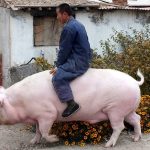Drummer Ginger Baker, who became rock’s first superstar percussionist as a member of the wildly popular ‘60s British power trio Cream, died Sunday in England. He was 80.
His Facebook and Twitter pages posted the news, saying “We are very sad to say that Ginger has passed away peacefully in hospital this morning.”
While he had struggled with substance abuse and ill health for many years, fans were alerted to his condition on Sept. 25 via a message on his Facebook page that read, “Announcement. Ginger is critically ill in hospital. Please keep him in your prayers. Thank you everyone.”

A flamboyant, hard-pounding performer with a temper as fiery as the red hair that gave him his nickname, Baker ranged through blues, psychedelia, hard rock, jazz-rock fusion, world music, and post-punk during his tempestuous career, which spanned six decades.
He was a member of rock’s first supergroup — Cream, also featuring Eric Clapton and the late Jack Bruce — and for better or worse, he can be credited with introducing the extended drum solo to the genre, principally with his Cream feature “Toad,” heard on the group’s 1966 debut album. (Drum solos were previously a fixture of jazz, the music Baker held closest.) He was among the first in rock to employ two bass drums, which contributed to his thunderous, rolling style.
He maintained his stardom in the late ‘60s and ‘70s via work with the short-lived post-Cream supergroup Blind Faith (which also featured Clapton and singer/keyboardist Steve Winwood) and his own units Ginger Baker’s Air Force and Baker Gurvitz Army, and darted from one musical association to another into the current millennium. Long-term addiction to heroin made him a risky proposition for employment.
He was also a notoriously volatile and difficult talent. Jay Bulger’s eye-opening 2012 documentary “Beware of Mr. Baker” — which took its title from a sign on the drummer’s property in South Africa — commenced with a sequence in which he hit the filmmaker with a cane.
He was inducted into the Rock and Roll Hall of Fame as a member of Cream; the group reunited for a series of concerts in London and New York in 2005 and was honored with a Grammy Lifetime Achievement Award the following year.
He was born Peter Edward Baker in South London on Aug. 19, 1939. He took up the drums at 15. Influenced by such American jazz players as Art Blakey, Max Roach, and Philly Joe Jones, he was schooled by top U.K. skin man Phil Seaman, who also fatefully
introduced his young student to heroin.
By 1965, Baker had become a force in the Graham Bond Organization, a jazz-blues aggregation led by its namesake Hammond B3 player and saxophonist. Scotsman Jack Bruce took the bass chair in the group.
The unit made two albums, but continuous tension between Baker and Bruce — a hallmark of their lengthy professional relationship — led the latter to exit Bond’s band for John Mayall’s Bluesbreakers; there, the bassist briefly worked with ex-Yardbirds phenom Eric Clapton before the guitarist’s exit from that unit.
In 1966, Baker approached Clapton, who had briefly worked as a free agent, to become a member of a new band he wanted to assemble. Clapton agreed, but insisted that Bruce be brought in on bass. Dubbed Cream — as in the cream of the crop — the resultant virtuosic threesome cut their debut “Fresh Cream” that fall.
The blues-based collection climaxed with “Toad,” a five-minute instrumental that featured a protracted Baker drum solo. The set reached No. 39 in the U.S. Appearances in American rock ballrooms, where Baker was allowed to cut loose instrumentally amid his band mates’ stormy jamming, helped launch Cream to the top of the pop heap and pave the way for the thundering, arena-filling rock bands that followed in their wake, particularly the Jimi Hendrix Experience and Led Zeppelin.
The band’s sophomore set “Disraeli Gears” was an overtly psychedelic entry that vaulted to No. 4 on the American charts in late 1967. It was succeeded in 1968 by the two-LP set “Wheels of Fire”; the No. 1 collection featured a freewheeling 16-minute concert rendition of “Toad” recorded at San Francisco’s Fillmore West.
By the time “Wheels of Fire” topped the charts, the pugnacious Baker and Bruce were again at each other’s throats, and the band dissolved after a valedictory show at London’s Royal Albert Hall and the album “Goodbye,” which posthumously climbed to No. 2 in 1969.
Clapton and Baker quickly formed Blind Faith with Winwood, who had temporarily disbanded his group Traffic, and bassist Ric Grech
of Family. Despite a controversial cover photo of a bare-breasted young girl holding a phallic metallic airplane (which upset retailers enough that an alternate jacket was created), the group’s self-titled album rocketed to No. 1 in the U.S. The set featured another drum
magnum opus by Baker, “Do What You Like.” However, lackluster live performances and a notable lack of personal chemistry led to the demise of the band within a year.
Undaunted, Baker swiftly assembled a unique jazz-rock big band, Ginger Baker’s Air Force, which initially included Winwood, Grech, Graham Bond, Moody Blues guitarist Denny Laine, Traffic reed and woodwind man Chris Wood, and his old mentor Phil Seamen on drums. The group’s debut, a self-titled live set cut at the Royal Albert Hall, rose to No. 33 in 1970. A second studio LP released the same year failed to chart domestically, and the band’s large size, which made touring an insupportable proposition, hastened its end.
After the end of Air Force, Baker, an ardent admirer of polyrhythmic African music, moved to Nigeria. There he pioneered world music, cutting a set with Nigerian firebrand Fela Kuti, who also appeared on Baker’s 1972 collection “Stratavarious.” Baker helped construct the nation’s first 16-track recording studio in Lagos, where Kuti was headquartered. Director Tony Palmer followed the drummer through the country for the 1973 BBC documentary “Ginger Baker in Africa.”
Baker returned to the power-trio business in 1974, teaming with brothers Paul and Adrian Gurvitz of the U.K. hard rock band Three Man Army for three Baker Gurvitz Army albums, none of which ascended into the top half of the U.S. album chart.
From the ‘70s on, Baker worked discontinuously, flitting from one project to another as a virtual drummer-for-hire. He recorded and toured with U.K. space-rock vets Hawkwind; cut an album with L.A.-based rockers Masters of Reality; filled the drum chair on “Album,” a set by John Lydon’s post-Sex Pistols unit Public Image Ltd.; and formed the Ginger Baker Trio, a jazz-leaning outfit with virtuoso bassist Charlie Haden and guitarist Bill Frisell. During his spells of musical inactivity, writers would occasionally track him down in Italy, where he owned an olive-growing farm for a time, and other locations; they were greeted with Baker’s characteristic ill humor.
He regrouped with his Cream mates Clapton and Bruce at their 1993 Rock and Roll Hall of Fame induction, and the following year embarked on a predictably short-lived collaboration with Bruce and guitarist Gary Moore in another power trio, BBM. Baker flew under the radar for much of the ‘90s and into the new millennium, recording sporadically and focusing much of his attention on raising polo ponies at his sprawling ranch outside Denver.
He subsequently moved to South Africa, where much of “Beware of Mr. Baker” was shot. Alternately candid and testy on screen, Baker’s own testimony about his messy domestic life and longtime drug addiction was counterpoised by damning interviews with ex-wives, former companions, and children.
He was active in a new quartet, the Ginger Baker Jazz Confusion, in 2013-14 with former James Brown bandleader and arranger Pee Wee Ellis, but a planned new edition of the Air Force was sidelined by the drummer’s deepening heart problems. He underwent open
heart surgery in June 2016, but recovered sufficiently to resume playing, albeit sporadically.
“It’s painful to drum,” he told Classic Rock earlier this year. “I have a terrible problem with my right knee, that it sometimes becomes difficult to play. I’ve got a big problem with my wrists. My doctor said it’s arthritis, and there ain’t nothing much you can do about it.”
Earlier this year [[[2019]]] he took part in a “Drum Legends” summit in England, which found him playing Cream songs alongside the Spencer Davis Group’s Pete York and former Scorpions drummer Herman Rarebell.
He is survived by his fourth wife, Kudzai Machokoto; a son, Kofi; and two daughters, Leda and Ginette.




